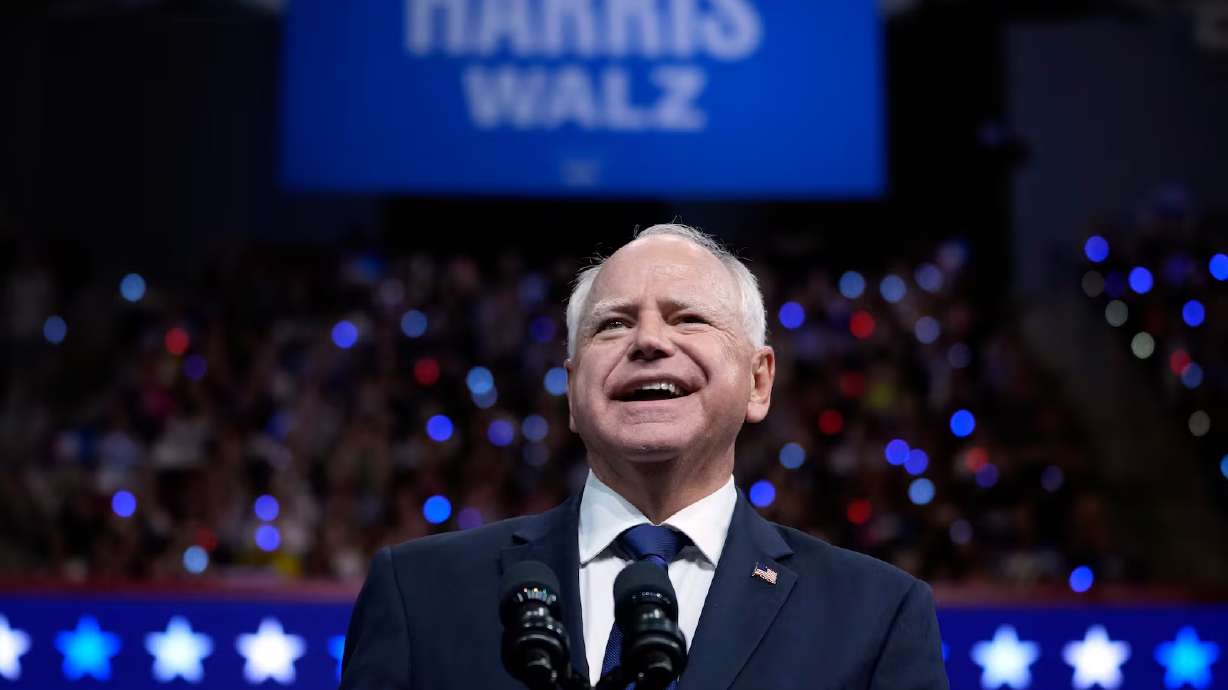Estimated read time: 3-4 minutes
This archived news story is available only for your personal, non-commercial use. Information in the story may be outdated or superseded by additional information. Reading or replaying the story in its archived form does not constitute a republication of the story.
SALT LAKE CITY — Amanda Stewart has never voted for a Democratic presidential candidate in her life. She's a lifelong Republican and a suburban mom in Tempe, Arizona. After Jan. 6, she vowed she would not support former President Donald Trump again, despite voting for him twice. And over the past two weeks — after hearing Vice President Kamala Harris' pitch to voters and being repulsed by Trump's "racist tirades" against her — she was warming to the idea of voting for the Democratic ticket.
Then Harris chose Minnesota Gov. Tim Walz as her running mate.
"I was really disappointed," Stewart said. "I was really hoping one of the presidential candidates would be making a more significant move to the center, where I think most of the country is."
To Stewart, the Walz pick is a signal that Harris is trying to energize the progressive flank of her party, not engage the swath of moderate and conservative voters who won't vote for Trump. "Her choice was not a good signal to me," Stewart said. "She needs to earn people from the center."
In the hours after the Walz news broke, that sentiment was repeated by swing-state voters across the country, who told the Deseret News that Harris' decision left them underwhelmed.
"As a Georgia voter, I'm beyond disappointed," said Emily Matthews, a Republican who voted for President Joe Biden in 2020 and Evan McMullin in 2016. "This is a signal that Harris is willing to bow to the left flank of her party and not stand up for truth."
In the two weeks since Harris assumed the role of Democrats' presumptive nominee, she seemed to be making plays for moderate or conservative voters. She has softened on some of her progressive policy stances. She launched the "Republicans for Harris" initiative and paraded endorsements from some Republican officeholders.
"When the 2020 riots hit, I was living alone in Atlanta and terrified," Matthews said. "No matter how righteous your cause is, making vulnerable neighbors live in fear is so deeply unrighteous. Walz's association and weakness with the Black Lives Matter movement in Minnesota speaks volumes to sensible voters who, in the interest of our country, were willing to cross lines and vote for a Democrat this year."
Gary Nelson, an independent voter in Payson, Arizona, who forms part of the "Republican Voters Against Trump" initiative, said he views the Walz pick as "positive." But he acknowledges that Walz might alienate moderate or conservative voters.

"For people who really follow the issues, (Walz) is really progressive," Nelson said. "He's not a moderate Democrat. That's clear."
Were there better alternatives to capture centrist or conservative voters? Several mentioned Pennsylvania Gov. Josh Shapiro, one of the candidates Harris interviewed to be her running mate, as their preferred choice. Tom Evslin, a Republican voter in Stowe, Vermont, was among them. "I was hoping she would move to the unoccupied center," Evslin, who co-chaired Haley's primary campaign in Vermont, said. "But she's moving to the left the way Trump is moving to the right."
Shapiro's candidacy for the vice president slot may have been torpedoed by progressive Democrats who disliked his policy positions on Israel and school choice.
"I liked the things the left doesn't like about Shapiro," Evslin said.
Walz might appeal to the middle by trying to come across as "America's dad," Nelson said. "If the other side is all doom-and-gloom, and Walz can come across as confident and also joyful, that helps folks."
But for many moderate or conservative voters, who hoped Harris' running mate pick would serve as an ideological olive branch, Walz falls short. "I'm sure he's a lovely person. I'm sure he is," Stewart, the Tempe voter, said. "But he is very ideological. That's not what the center wants right now."









